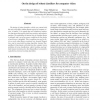Free Online Productivity Tools
i2Speak
i2Symbol
i2OCR
iTex2Img
iWeb2Print
iWeb2Shot
i2Type
iPdf2Split
iPdf2Merge
i2Bopomofo
i2Arabic
i2Style
i2Image
i2PDF
iLatex2Rtf
Sci2ools
105
click to vote
CVPR
2010
IEEE
2010
IEEE
On the design of robust classifiers for computer vision
The design of robust classifiers, which can contend with the noisy and outlier ridden datasets typical of computer vision, is studied. It is argued that such robustness requires loss functions that penalize both large positive and negative margins. The probability elicitation view of classifier design is adopted, and a set of necessary conditions for the design of such losses is identified. These conditions are used to derive a novel robust Bayes-consistent loss, denoted Tangent loss, and an associated boosting algorithm, denoted TangentBoost. Experiments with data from the computer vision problems of scene classification, object tracking, and multiple instance learning show that TangentBoost consistently outperforms previous boosting algorithms.
Boosting Algorithms | Computer Vision | CVPR 2010 | Outlier Ridden Datasets | Robustness Requires Loss |
Related Content
| Added | 02 Aug 2010 |
| Updated | 02 Aug 2010 |
| Type | Conference |
| Year | 2010 |
| Where | CVPR |
| Authors | Hamed Masnadi-Shirazi, Nuno Vasconcelos, Vijay Mahadevan |
Comments (0)

